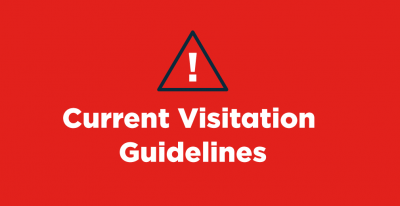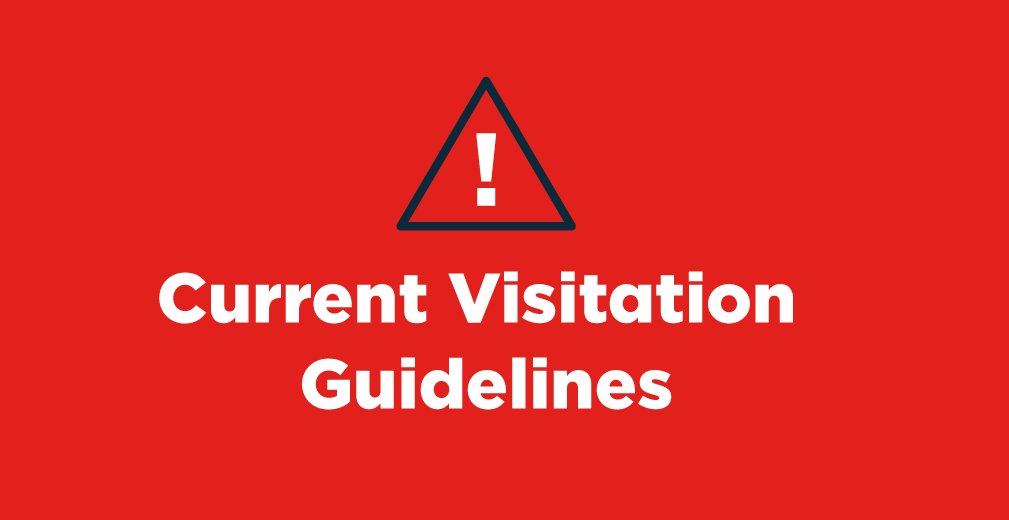NEWS RELEASE
Floyd is easing its visitation policy but will continue to limit visitors as COVID-19 continues to be present in the community. Effective at 8 a.m. Friday, May 22, one visitor may accompany a patient who is receiving care at most Floyd locations, including hospitals, Floyd Primary Care and Floyd Urgent Care offices and other outpatient locations.
Patients who are COVID-19 positive or suspected to have the virus cannot receive visitors.
Visitors will be screened for flu-like symptoms, such as fever, cough or shortness of breath. If any of these symptoms exist, the visitor will not be allowed entrance. All patients and visitors will be given masks to wear. They will be asked to observe social distancing and practice hand-hygiene protocols.
Children under the age of 13 will still not be permitted to visit. Visitors older than 65 and those who are at increased risk for complications from COVID-19 are discouraged from visiting or staying overnight.
Floyd implemented a no-visitor policy in early March when cases of COVID-19 were first being diagnosed throughout the region.
Dr. Sheila Bennett, Floyd’s Executive Vice President and Chief of Patient Services, said she sympathizes with families and patients who have been unable to see each other while receiving care.
“One important reason Floyd Health System wanted to ease visitation restrictions as soon as it could be done safely is because it is so important to patients and their physical and mental wellbeing. Patients just do better and get well more quickly if they have the support of family and friends,” said Dr. Bennett.
The following entrance guidelines will apply at Floyd Medical Center, Polk Medical Center and Cherokee Medical Center:
- Non-emergency patients and visitors may enter hospitals only at the main entrances.
- Emergency patients and visitors should enter hospitals at the emergency room entrances.
- Floyd Medical Center’s North Entrance on Turner McCall Boulevard and the Turner McCall Boulevard parking deck are closed to the public.
Floyd is making every effort to make visitations more convenient for mothers giving birth. Laboring mothers and their attending visitor will be screened and provided a mask before being admitted to the facility. Designated visitors will receive an armband they must always wear the armband to give them access to labor and delivery rooms.
Babies in the Neonatal Intensive Care Unit at Floyd Medical Center will be permitted two visitors with an issued ID band.
Requests for additional visitors due to special circumstances, such as end-of-life or a critically ill or injured family member, will be considered on a case-by-case basis.
All visitors will be required to:
- Wash hands frequently for at least 20 seconds with soap and water especially after you have blown your nose, coughed, or sneezed. Throw used tissues in the trash.
- Use a hand sanitizer that contains at least 60% alcohol if soap and water are not readily available. Cover all surfaces of your hands and rub them together until they feel dry.
- Avoid touching your eyes, nose, and mouth with unwashed hands.
- Put distance between yourself and other people
- Remember that some people without symptoms may be able to spread the virus.
- Stay at least 6 feet (about 2 arms’ length from other people).
- Cover your mouth and nose with a cloth face cover or surgical mask when you are within 6 feet of the patient that you are visiting. This mask is meant to protect other people in case you are infected. The mask is not a substitute for social distancing.
- If you leave the patient’s room, make sure that you have your mask on and are practicing social distancing.
Floyd’s billing offices on Second Avenue in Rome will be closed to the public until further notice. If you have a billing question or need assistance, call our customer service offices:
- Hospital Billing Questions – 706.509.6000
- Physician Billing Questions – 706.509.3040
Willowbrooke at Floyd will also remain closed to visitors.
COVID 19 is a contagious disease and spreads quickly. COVID19 can be dangerous, especially to people who are seriously ill or living with chronic conditions. A person can have COVID-19 with mild or no symptoms and unknowingly spread it to others.

